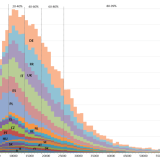
Mercati del lavoro funzionanti e inclusivi
Il buon funzionamento dei mercati del lavoro è un prerequisito per sfruttare appieno il potenziale dell’economia in termini di creazione di posti di lavoro una volta superata la crisi finanziaria ed economica. La crisi ha avuto innumerevoli conseguenze per il mercato del lavoro negli Stati membri dell’UE e alcuni gruppi come i giovani e le persone con un basso livello di istruzione ne sono stati particolarmente colpiti. Inoltre, i rapidi cambiamenti strutturali in corso comportano nuove sfide legate a eventuali carenze di manodopera e squilibri tra domanda e offerta di competenze in vari settori e regioni.
Il principale strumento dell’UE per promuovere l’occupazione e l’inclusione sociale è il Fondo sociale europeo che aiuta le persone a trovare un lavoro, integra i soggetti svantaggiati nella società e garantisce opportunità di vita più eque per tutti. Vi è inoltre un’ampia normativa europea che disciplina i diritti dei lavoratori nel mercato del lavoro. Per di più, nell’aprile 2017, la Commissione europea ha istituito il pilastro europeo dei diritti sociali, che amplia e integra la politica sociale e occupazionale dell’UE al fine di orientare le politiche in alcuni ambiti fondamentali per il buon funzionamento e per l’equità dei mercati del lavoro e dei sistemi previdenziali.
- Commissione europea: Fondo sociale europeo
- Commissione europea: Pilastro europeo dei diritti sociali




















